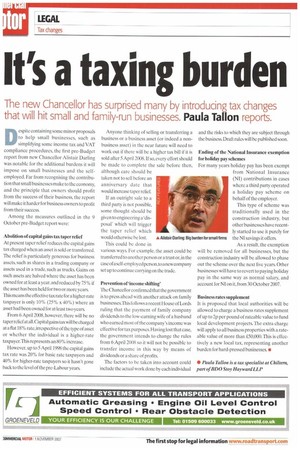It's a taxing burden
Page 44

If you've noticed an error in this article please click here to report it so we can fix it.
The new Chancellor has surprised many by introducing tax changes that will hit small and family-run businesses. Paula Tallon reports.
Despite containing some minor proposals to help small businesses, such as simplifying some income tax and VAT compliance procedures, the first pre-Budget report from new Chancellor Alistair Darling was notable for the additional burdens it will impose on small businesses and the selfemployed. Far from recognising the contribution that small businesses make to the economy, and the principle that owners should profit from the success of their business, the report will make it harder for business owners to profit from their success.
Among the measures outlined in the 9 October pre-Budget report were: Abolition of capital gains tax taper relief At present taper relief reduces the capital gains tax charged when an asset is sold or transferred. The relief is particularly generous for business assets, such as shares in a trading company or assets used in a trade, such as trucks. Gains on such assets are halved where the asset has been owned for at least a year, and reduced by 75% if the asset has been held for two or more years. This means the effective tax rate for a higher-rate taxpayer is only 10% (25% x 40%) where an asset had been owned for at least two years.
From 6 April 2008, however, there will be no taper relief at all. Capital gains tax will be charged at a flat 18% rate, irrespective of the type of asset or whether the individual is a higher-rate taxpayer.This represents an 80% increase.
However, up to 5 April 1998 the capital gains tax rate was 20% for basic rate taxpayers and 40% for higher-rate taxpayers so it hasn't gone back to the level of the pre-Labour years. Anyone thinking of selling or transferring a business or a business asset (or indeed a nonbusiness asset) in the near future will need to work out if there will be a higher tax bill if it is sold after 5 April 2008. If so, every effort should be made to complete the sale before then, although care should be taken not to sell before an anniversary date that would increase taper relief.
If an outright sale to a third party is not possible, some thought should be given to engineering a 'disposal' which will trigger the taper relief which would otherwise be lost.
This could be done in various ways. For example. the asset could be transferred to another person or a trust or, in the case of a self-employed person, to a new company set up to continue carrying on the trade.
Prevention of 'income shifting' The Chancel I or confirmed that the government is to press ahead with another attack on family businesses.This follows a recent House of Lords ruling that the payment of family company dividends to the low-earning wife of a husband who earned most of the company's income was effective for tax purposes. Having lost that case, the government intends to change the rules from 6 April 2008 so it will not be possible to transfer income in this way by means of dividends or a share of profits.
The factors to be taken into account could include the actual work done by each individual and the risks to which they are subject through the business. Draft rules will be published soon.
Ending of the National Insurance exemption for holiday pay schemes For many years holiday pay has been exempt from National Insurance (NI) contributions in cases where a third party operated a holiday pay scheme on behalf of the employer.
This type of scheme was traditionally used in the construction industry. but other businesses have recently started to use it purely for the NI savings it offers.
As a result, the exemption will be removed for all businesses, but the construction industry will be allowed to phase out the scheme over the next five years. Other businesses will have to revert to paying holiday pay in the same way as normal salary, and account for NI on it, from 30 October 2007.
Business rates supplement It is proposed that local authorities will be allowed to charge a business rates supplement of up to 2p per pound of rateable value to fund local development projects. The extra charge will apply to all business properties with a rateable value of more than £50,000. This is effectively a new local tax, representing another burden for hard-pressed businesses. •






















































































































































































